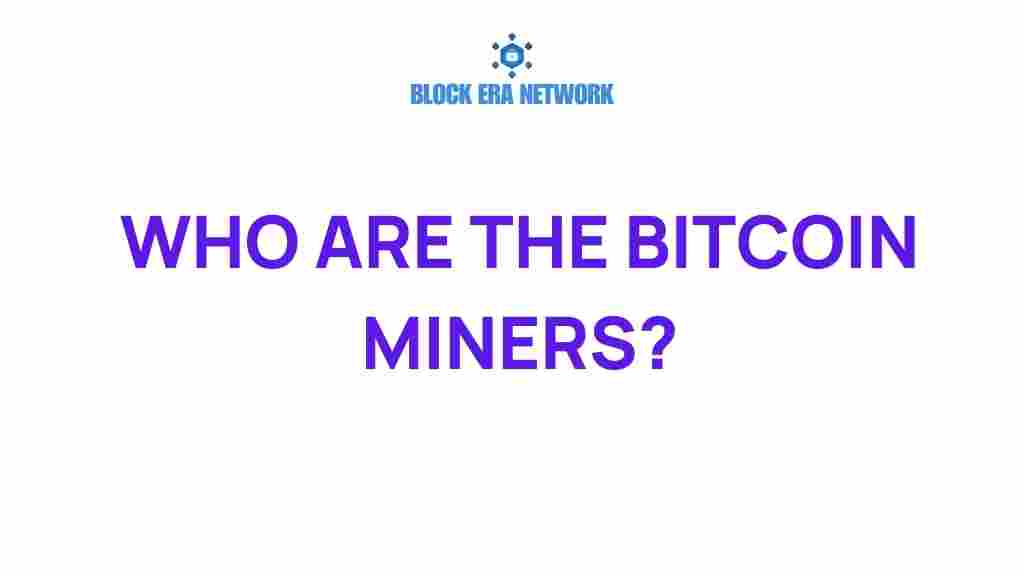Unveiling the Mystique: Who Really Are Bitcoin Miners?
The world of cryptocurrency can seem daunting and complex, particularly for those new to the space. At the heart of this digital revolution lies a group of individuals and organizations known as Bitcoin miners. These miners play a critical role in the ecosystem of blockchain technology, ensuring the security and integrity of transactions. In this article, we will explore who Bitcoin miners are, how the mining process works, the rewards they earn, and their contribution to the decentralization of digital currency.
The Role of Bitcoin Miners in Cryptocurrency
Bitcoin miners are not just tech-savvy individuals but are crucial to the functioning of the Bitcoin network. Their primary responsibilities include:
- Verification of Transactions: Miners validate and verify transactions by solving complex mathematical problems.
- Securing the Network: By confirming transactions, miners add blocks to the blockchain, enhancing the overall network security.
- Decentralization: Mining helps maintain the decentralized nature of Bitcoin, preventing any single entity from gaining control over the network.
The Mining Process Explained
Understanding the mining process is essential to grasping how Bitcoin miners operate. Here is a step-by-step breakdown:
1. Transaction Creation
When a user initiates a Bitcoin transaction, it gets broadcasted to the network. This transaction includes details such as the sender’s and receiver’s addresses and the amount being transferred.
2. Transaction Pool
Once transactions are broadcasted, they enter a pool known as the memory pool or mempool, where miners can access them.
3. Block Formation
Miners select transactions from the mempool to form a new block. Each block typically contains a collection of transactions and a reference to the previous block, forming a chain.
4. Solving the Mathematical Problem
To add the new block to the blockchain, miners must solve a complex cryptographic puzzle. This process is known as proof of work. The first miner to solve the puzzle gets to add the new block to the blockchain.
5. Block Addition and Rewards
Once a miner successfully solves the puzzle, the new block is added to the blockchain, and the miner is rewarded with newly minted bitcoins and transaction fees from the transactions included in the block. This reward is an incentive for miners to continue securing the network.
Understanding Mining Rewards
The rewards that Bitcoin miners receive are twofold:
- Block Reward: This is the fixed number of bitcoins awarded to the miner who successfully adds a new block to the blockchain. Currently, this reward is 6.25 bitcoins per block, but it halves approximately every four years in an event known as the halving.
- Transaction Fees: In addition to the block reward, miners earn transaction fees for the transactions they include in the blocks they mine. These fees incentivize miners to prioritize certain transactions over others.
The Importance of Decentralization
Decentralization is one of the core principles of Bitcoin and other cryptocurrencies. Bitcoin miners contribute to this decentralization in several ways:
- Diverse Participation: Miners can be anyone with the necessary hardware and software, leading to a diverse network of participants.
- Prevention of Centralization: By distributing the mining process across numerous miners globally, Bitcoin prevents any single entity from exerting control over the network.
- Trustless Environment: The decentralized nature of mining allows users to trust the system without needing to trust any individual miner.
The Technology Behind Bitcoin Mining
Bitcoin mining relies on advanced technology and equipment. Here are some key components:
Hardware
Bitcoin mining requires powerful hardware to solve complex mathematical problems. The most common types of mining hardware include:
- ASIC Miners: Application-Specific Integrated Circuits are specialized hardware designed specifically for mining Bitcoin. They provide the highest efficiency and hashing power.
- GPU Miners: Graphics Processing Units were traditionally used for mining but are now less efficient than ASIC miners for Bitcoin.
Mining Software
Miners use software to connect their hardware to the Bitcoin network. This software helps manage the mining process, track rewards, and monitor performance.
Mining Pools
Many miners join mining pools to increase their chances of earning rewards. In a mining pool, multiple miners combine their hashing power to solve blocks more efficiently. The rewards are then distributed among the participants based on their contributed hashing power.
Troubleshooting Common Mining Issues
Despite the rewards, Bitcoin mining can come with its challenges. Here are some common issues and troubleshooting tips:
1. Low Hash Rate
A low hash rate can significantly affect mining profitability. This can happen due to:
- Outdated hardware.
- Poor internet connection.
- Incorrect mining software configuration.
**Solution:** Upgrade hardware and ensure your internet connection is stable. Review your mining software settings to ensure they are configured correctly.
2. High Electricity Costs
Mining consumes a lot of energy, leading to high electricity bills, which can eat into profits.
**Solution:** Consider relocating your mining operation to areas with cheaper electricity rates or explore renewable energy options.
3. Difficulty Adjustments
The Bitcoin network adjusts the difficulty of mining approximately every two weeks. This can make it harder for miners to earn rewards.
**Solution:** Stay informed about difficulty adjustments and consider joining a mining pool to mitigate the impact.
Conclusion
Bitcoin miners are the backbone of the Bitcoin network, playing a vital role in securing transactions and maintaining the integrity of the blockchain. Through the mining process, they not only validate transactions but also contribute to the decentralization of digital currency, ensuring that no single entity can control the network.
As technology continues to evolve, so too will the methods and equipment used by Bitcoin miners. Understanding their role is crucial for anyone looking to delve into the world of cryptocurrency. Whether you are considering becoming a miner yourself or simply want to understand how this fascinating ecosystem operates, the journey of a Bitcoin miner is an intriguing blend of technology, finance, and community.
For more information on cryptocurrency and blockchain technology, check out this comprehensive guide.
This article is in the category Cryptocurrency Insights and created by Block Era Network Team
